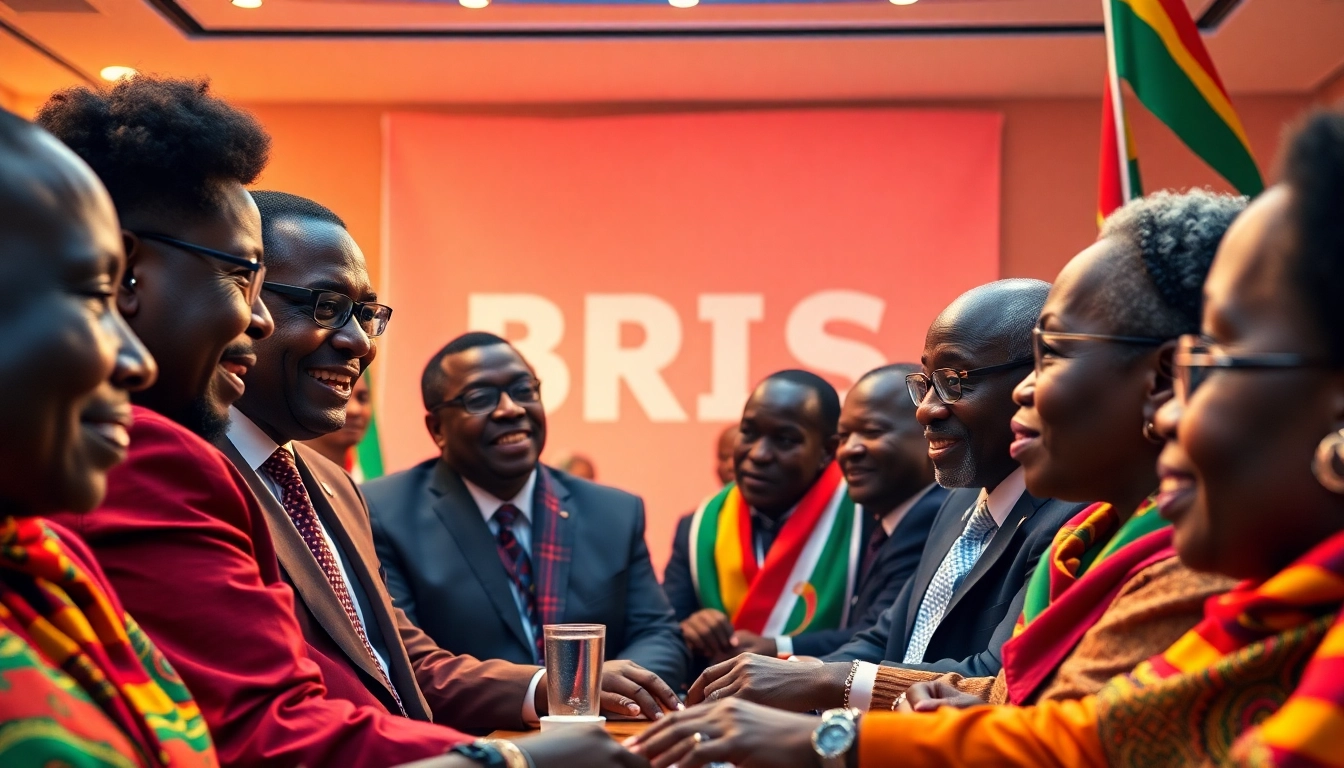Understanding the BRICS Framework
Origin and Evolution of the BRICS Alliance
The BRICS alliance, an acronym that represents Brazil, Russia, India, China, and South Africa, was officially formed in 2010, though its origins trace back to a series of dialogues in the early 2000s. The term “BRIC” first appeared in a 2001 report by Jim O’Neill of Goldman Sachs, who predicted that these emerging economies would become leading players on the global stage. The inclusion of South Africa in 2010 completed the group as BRICS. This evolving alliance signals a shift toward a multipolar world, where emerging economies collaborate and assert their interests in the global economy.
Key Economic and Political Objectives
The BRICS nations aim to foster economic cooperation, promote peace and security, and enhance their global influence. One of the pivotal objectives of the group is to reform international financial institutions like the World Bank and the International Monetary Fund (IMF) to better reflect the realities of the global economy. Furthermore, the BRICS nations strive to increase trade and investment among themselves, share technology, and collaborate on sustainable development initiatives. This alignment not only strengthens their economies but also positions them as key players in global governance.
Impact on Global Power Dynamics
The emergence of BRICS has significantly altered global power dynamics. Historically dominated by Western nations, the power balance is gradually shifting as BRICS nations assert their presence in various international forums. This shift signals a reconfiguration of geopolitical alliances, where non-Western perspectives are gaining more prominence. In essence, BRICS offers an avenue for these nations to challenge the existing world order and pursue collective interests.
The Role of Africa in BRICS
Africa’s Strategic Importance to BRICS
Africa holds a crucial position within the BRICS framework, primarily due to its rich natural resources and its emerging markets. The continent’s potential for sustainable economic growth has attracted the attention of the BRICS nations, particularly with an abundance of minerals, agricultural land, and youthful populations ready to enter the labor force. The African continent’s participation in BRICS enhances its visibility in international dialogue, allowing its leaders to voice concerns that would otherwise go unheard.
Investment Trends: More than Just Aid
In recent years, investment trends by BRICS countries in Africa have shifted from the traditional aid-based model to one where partnerships and mutual benefits are prioritized. For example, Chinese investment in African infrastructure has skyrocketed, with projects in areas like roads, railways, and telecommunications improving connectivity and trade. Similarly, Russia’s involvement in Africa has expanded to include not just arms sales but also investments in agriculture and energy, indicating a robust, multi-faceted approach to investment that supports long-term development goals.
Success Stories from African Nations
Several African nations have showcased how BRICS engagement can lead to transformative outcomes. For instance, Senegal’s partnership with China has led to significant advancements in infrastructure, bolstered by the Belt and Road Initiative, which aims to enhance trade routes through strategic investments. South Africa, as a BRICS member, has leveraged its position to attract foreign investment and enhance its global competitiveness. These success stories highlight the potential for BRICS partnerships to drive growth and development across the continent.
Challenges Facing BRICS Participation
Geopolitical Tensions and Their Effects
Despite the opportunities that BRICS presents for African nations, challenges persist. Geopolitical tensions, particularly among BRICS countries, can create friction that undermines cooperation. For example, China and India have ongoing border disputes, which may impede collaborative efforts within the framework. Similarly, Russia’s aggressive foreign policy can affect perceptions and relationships among member states as they navigate their respective alliances and interests.
Internal Divisions within the BRICS Group
Internal divisions among BRICS members pose an additional challenge to cohesive action. Differences in political systems, economic priorities, and development strategies can create obstacles to unified decision-making. These disparities make it difficult for the group to present a cohesive stance on global issues, leading to fragmented initiatives and undermining the collective power of BRICS on the global stage.
Concerns Over Economic Sovereignty
As African nations engage more deeply with BRICS, concerns about economic sovereignty often arise. Many view foreign investment as double-edged; while it can stimulate growth, it may also lead to dependency on external powers. Critics argue that countries must be cautious in negotiation terms to ensure that they retain control over their resources and economic futures. Ensuring that BRICS partnerships honor the principles of mutual respect and benefit is crucial for maintaining sovereignty.
Examining China and Russia’s Influence
Investment Patterns in African Economies
China’s influence in African economies is marked by significant investments across various sectors, including mining, energy, and infrastructure. The nation has become Africa’s largest trading partner, reflecting its focus on fostering relationships with resource-rich countries. Concurrently, Russia’s approach, though smaller in scale, is notable for its focus on military cooperation and energy exploration. Both countries are increasingly shifting the narrative from mere extractive engagement to partnership-driven investments aimed at promoting local economies.
Geopolitical Strategies: A Double-Edged Sword
The geopolitical strategies employed by China and Russia in Africa can act as a double-edged sword. While the partnerships can lead to economic development and modernization of infrastructure, they may also bring about a form of neo-colonialism, where African countries become beholden to foreign powers for economic stability. Therefore, it is essential for African nations to strategically navigate these relationships to ensure they do not compromise their autonomy and economic resilience.
The Future of BRICS Relations with Africa
Looking ahead, the future of BRICS relations with Africa appears promising but will be contingent upon the ability to address existing challenges. Strengthening intra-BRICS cooperation and fostering genuine partnerships will be paramount to achieving sustainable development goals. Furthermore, the emergence of new alignments, such as BRICS+, which includes nations beyond the original members, could enhance Africa’s bargaining power and solidify its stature on the global stage. However, African nations must prioritize strategic planning and maintaining their sovereignty when engaging with BRICS counterparts.
Looking Ahead: The Future of BRICS Africa Relations
Potential New Alliances and Partnerships
As BRICS expands and evolves, new alliances and partnerships are on the horizon. Countries across Africa are recognizing the need to forge strategic alliances beyond traditional Western partnerships. The potential inclusion of additional emerging economies into BRICS could offer African nations unprecedented leverage in global negotiations. Collaborative initiatives focusing on shared interests—such as climate change, technology transfers, and sustainable development—will underpin future alliances.
Forecasting Economic and Political Trends
The economic and political landscapes are continuously dynamic, with shifts influenced by both internal and external factors. It is anticipated that BRICS nations will increasingly seek to diversify their economic interactions, moving away from solely resource-driven relationships. Trade agreements that prioritize sustainable practices and equitable relations could redefine the economic partnerships typical in past decades. Politically, as the influence of BRICS grows, the group may act as a counterbalance to Western hegemony, fostering a more multipolar world order.
Strategies for Sustainable Growth in Africa
To ensure sustained growth, African nations must prioritize developing robust frameworks that encapsulate the principles of sustainable development within the BRICS model. This includes implementing policies that enhance local capacity while reviewing investment contracts to ensure they are fair and beneficial. Collaborative ventures that prioritize knowledge sharing and technology transfer could further empower African economies and facilitate sustainable growth.
Growing interest in the analyse BRICS Afrique highlights the intricate relationship between Africa and the BRICS alliance, emphasizing the need for thorough examination and strategic planning as countries navigate this evolving landscape. The next chapter in the BRICS and Africa relationship is critical for both economic advancement and the geopolitical narrative.



